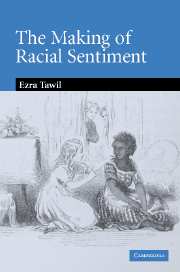Book contents
- Frontmatter
- Contents
- Acknowledgments
- Introduction: Toward a literary history of racial sentiment
- 1 The politics of slavery and the discourse of race, 1787–1840
- 2 Remaking natural rights: race and slavery in James Fenimore Cooper's early writings
- 3 Domestic frontier romance, or, how the sentimental heroine became white
- 4 “Homely legends”: the uses of sentiment in Cooper's The Wept of Wish-Ton-Wish
- 5 Stowe's vanishing Americans: “negro” interiority, captivity, and homecoming in Uncle Tom's Cabin
- Conclusion: Captain Babo's cabin: racial sentiment and the politics of misreading in Benito Cereno
- Notes
- Index
1 - The politics of slavery and the discourse of race, 1787–1840
Published online by Cambridge University Press: 22 September 2009
- Frontmatter
- Contents
- Acknowledgments
- Introduction: Toward a literary history of racial sentiment
- 1 The politics of slavery and the discourse of race, 1787–1840
- 2 Remaking natural rights: race and slavery in James Fenimore Cooper's early writings
- 3 Domestic frontier romance, or, how the sentimental heroine became white
- 4 “Homely legends”: the uses of sentiment in Cooper's The Wept of Wish-Ton-Wish
- 5 Stowe's vanishing Americans: “negro” interiority, captivity, and homecoming in Uncle Tom's Cabin
- Conclusion: Captain Babo's cabin: racial sentiment and the politics of misreading in Benito Cereno
- Notes
- Index
Summary
GENEALOGY OF A “GENERAL SILENCE”
Scholars have long puzzled over Thomas Jefferson's celebrated “ambivalence” about the politics of slavery. Though later generations would look to Jefferson alternately as the patron saint of antislavery and as the father of American racism, his contemporaries knew him primarily as a man who had, in his own words, “carefully avoided every public act or manifestation” on the subject of slavery. It is true that throughout the 1770s Jefferson had been quite outspoken against the institution. In 1774 he had referred in print to slavery as an “infamous practice” which “deeply wounded” the “rights of human nature.” The “abolition of domestic slavery,” he had written, “is the great object of desire in those colonies where it was unhappily introduced in their infant state.” In his original draft of the Declaration of Independence (in sections purged from the final document), he had denounced the slave trade as an “execrable commerce” and listed it among the complaints against the crown (22). And in drafting a Constitution for Virginia in 1776, he had tried to insert a clause prohibiting the importation of slaves (344).
But there is a curious discrepancy between the publicly outspoken Jefferson of the years leading up to the Revolution and the reticent and circumspect statesman of the Early Republic. From the late 1780s on, “the most remarkable thing about Jefferson's stand on slavery is his immense silence.”
- Type
- Chapter
- Information
- The Making of Racial SentimentSlavery and the Birth of The Frontier Romance, pp. 26 - 68Publisher: Cambridge University PressPrint publication year: 2006



